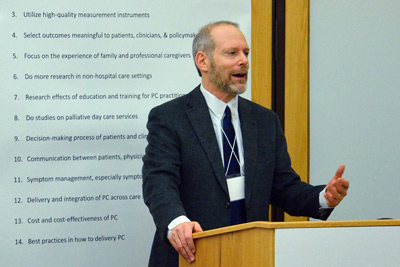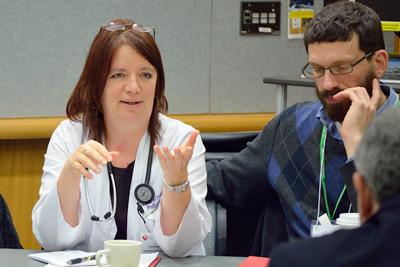Researchers, practitioners refine palliative care
By Ted Boscia


The emerging field of palliative care - which offers treatments to alleviate pain, suffering and stress for patients diagnosed with serious illness, but distinct from hospice care - is taking hold in U.S. medicine. While it wins praise for its patient-centered approach and potential cost savings, the field remains largely unstudied, leaving practitioners with little evidence to improve methods.
Addressing these gaps, a team of researchers from the College of Human Ecology, the Bronfenbrenner Center for Translational Research (BCTR) and Weill Cornell Medical College met with local palliative and hospice care professionals in a workshop Feb. 15 at Cayuga Medical Center (CMC). The meeting, co-sponsored by the CMC Palliative Care Program and Hospicare and Palliative Care Services of Tompkins County, followed a consensus workshop model, an approach invented by Cornell scientists that places researchers alongside practitioners to share their knowledge on a topic before voting on a research agenda.
"Our belief is that if you want to bridge the gap between researchers and practitioners, you have to create these micro-environments where the two sides can come together," said workshop organizer Karl Pillemer, the Hazel E. Reed Professor in the Department of Human Development. "Simply receiving our written recommendations or listening to a formal presentation is not nearly as powerful as sitting down together to hash out the big questions regarding palliative care."
Prior to meeting, the Cornell team studied more than 200 journal review articles on palliative care and interviewed more than 50 academic thought leaders from the field. They distilled their findings into 14 specific topics to research.
"We are looking at a lot of research that's produced -- some of it is valuable and some of it is more esoteric," said Dale B. Johnson, executive director of Hospicare and Palliative Care Services of Tompkins County. "I saw nothing off base in the Cornell group's recommendations, and they touched on the whole range of issues we face."
Deb Parker Traunstein, coordinator for the CMC Palliative Care Program, noted a sharp increase in palliative care consultations by the hospital in recent years. Among her recommendations, she urged researchers to consider how to tailor treatments to a diverse patient base and how to best deliver care in a variety of community settings.
Workshop participants included doctors, nurses, chaplains, social workers, administrators and others who play a role on palliative care teams. "We invited as broad a range of professionals as possible so that everyone would have a chance to make their voices heard and enhance our understanding of the problems," said Dr. M. Cary Reid, associate professor of medicine at Weill Cornell Medical College.
Though researchers cautioned that the workshop results are not final, a few recommendations stood out:
- Adapt palliative care programs for people with mental illness or developmental disabilities;
- Assess public awareness of the dying process and end-of-life care to build better education programs; and
- Examine family communication practices related to end-of-life planning.
The Cornell team will merge the results of the Ithaca workshop with recommendations from a similar gathering with palliative care professionals they hosted in January in New York City. Eventually, they will publish their recommendations in an academic journal and distribute them to major funding agencies to help steer an agenda for the field.
The workshops were funded by the Lawrence and Rebecca Stern Family Foundation, which provided $200,000 to the College of Human Ecology to support research on a national model for palliative care. Once the workshop recommendations are final, the gift will also fund a number of pilot projects by Cornell researchers on the most pressing topics.
Ted Boscia is assistant director of communications for the College of Human Ecology.
Media Contact
Get Cornell news delivered right to your inbox.
Subscribe